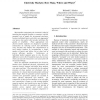Free Online Productivity Tools
i2Speak
i2Symbol
i2OCR
iTex2Img
iWeb2Print
iWeb2Shot
i2Type
iPdf2Split
iPdf2Merge
i2Bopomofo
i2Arabic
i2Style
i2Image
i2PDF
iLatex2Rtf
Sci2ools
95
Voted
HICSS
2006
IEEE
2006
IEEE
Electricity Markets: How Many, Where and When?
Most markets compromise the economist’s ideal of matching the marginal benefits to consumers with the marginal cost of supply for incremental purchases because individual buyers and sellers are aggregated over space, time and/or other product attributes like quality or reliability. These aggregations into discrete market segments are designed to facilitate transactions by reducing search and distribution costs, and they may enhance the competitiveness of each market segment by encompassing a larger number of buyers and sellers, but at some loss of precise efficiency matches. Furthermore, as individual market segments grow in size, the price differences across their boundaries may also increase which can raise the transactions costs associated with increased arbitrage. These are important considerations for electricity markets since significant physical, operational and capacity barriers separate and define these markets over space and time. Thus principles for the optimal structure ...
Related Content
| Added | 11 Jun 2010 |
| Updated | 11 Jun 2010 |
| Type | Conference |
| Year | 2006 |
| Where | HICSS |
| Authors | Nodir Adilov, Richard E. Schuler |
Comments (0)

